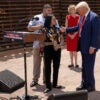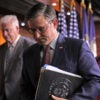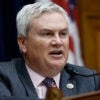Below in its entirety is a commentary on accused spy Walter Kendall Myers written by Heritage’s Vice President for Communications Mike Gonzalez. It appeared in today’s Washington Times.
Walter Kendall Myers, the State Department analyst accused of spying for Havana for 30 years, made me lose my innocence soon after I started working at the department in late 2006.
I learned because of him that, while many Foreign Service Officers are patriots who put their private political beliefs aside while in government service, there is a substratum of officials whose personal ideology permits them to tolerate the unforgivable. Years before the current treason accusations against Mr. Myers, I learned that getting rid of obvious policy saboteurs was well nigh impossible at State.
This epiphany came because of remarks Mr. Myers made in November that year to an audience at Johns Hopkins University. The observations had nothing to do with Cuba; in fact, they were about our closest ally, the United Kingdom.
Mr. Myers’ comments were indiscreet, contemptible and may have even broken the law. They should by all rights have gotten Mr. Myers fired and earned him rebuke from his diplomatic peers. Instead, I saw him feted and supported. All the department was able to do was give Mr. Myers a slap on the wrist, while many of his colleagues gave him a slap on the back. Frankly, he should have been slapped on the face.
Specifically, and most damning, here’s what Mr. Myers said on Nov. 29, 2006, about our strongest alliance: “I wish they would break it with us. Rather personally, I want to see the British more closely attached to Europe.”
Here was a man who had taken an oath to further U.S. interests, wishing that a key ally broke away and sided with a European Union that at the time was explicitly selling itself as a counterweight to U.S. power. And, no, these comments had nothing to do with Mr. Myers’ visceral dislike of the Bush administration (not that his personal feelings should have made a difference, since he was sworn to serve the administration). The context made it clear that Mr. Myers thought the Anglo-American relationship had served U.S. interests better than Britain’s all along, and he railed against that.
The “special relationship,” a term first coined by Winston Churchill in 1946, “has been, from the very beginning, very one-sided, with no payback, no sense of reciprocity. There never really has been a special relationship, or at least not one we’ve noticed,” Mr. Myers said. He also denounced Prime Minister Tony Blair for sending troops to Iraq to back our men and women in uniform, who were then fighting al Qaeda door to door there.
Mr. Myers, who taught at Johns Hopkins’ School of Advanced International Studies and at the State Department’s Foreign Service Institute, thought he was just speaking to his audience. But a friend of mine, the hardworking reporter Toby Harnden of Britain’s best-selling broadsheet, the Daily Telegraph, was there and splashed the comments on the front page the next day.
Mr. Myers’ comments greatly damaged U.S. foreign policy at the time, as Mr. Blair was then fighting at home political charges that he was a “poodle” to President George W. Bush. But think also of the damage Mr. Myers did teaching young minds all those years.
I don’t know if Mr. Myers and his wife Gwendolyn, also accused of treason and behind bars, are guilty of spying for Fidel Castro for three decades. They will have their day in court (something denied to Cubans). I notice there is now debate about how much harm they could have done as spies, if it’s proven they were spies. There should be no debate about the rest.
Higher-ups tried to discipline Mr. Myers back in 2006, but couldn’t fire him. I saw him at a Christmas party at State that year, surrounded by his coterie of friends. “He said what we all believe,” one told me. Mr. Myers was allowed to retire quietly with all benefits a year later, at age 70. He continued to teach.
Mr. Myers’ treatment in the press today parallels this adulation. Much has been written about how Mr. Myers is a debonair, blue-blood Washingtonian who was always delightful to his colleagues and neighbors. Why, he’s Alger Hiss! Even his sailing prowess has been remarked upon. No one has asked whether Mr. Myers ever pondered, while piloting his schooner on the Chesapeake Bay, why it was that the people of Cuba – whose oppression he abetted – are barred from owning boats, rafts or anything else that can float away from the Devil’s Island the Castro brothers have created in the Tropics.




























